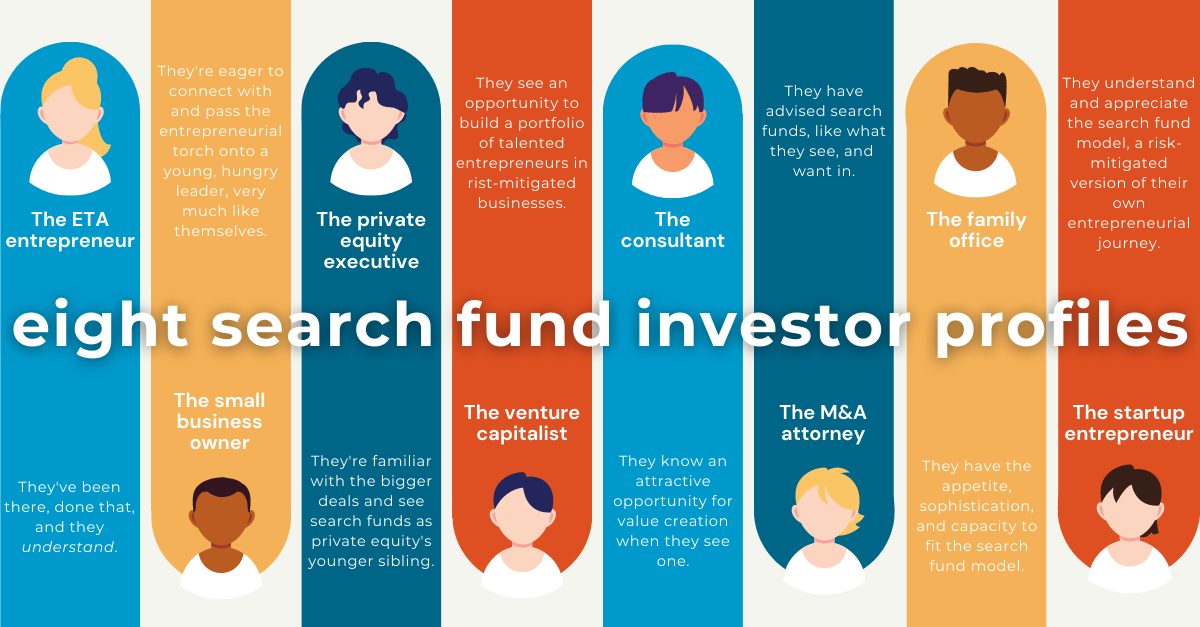The 8 most common search fund investor profiles
It is commonly said that your search capital is likely to come from people who know you really well or know the model really well. But when I first brought SMEVentures to Australia, investors knew neither me nor the model, making the path to closing a bit rocky.
Australians are generally a friendly bunch, and many of them agreed to meet me over coffee, yielding a fair bit of encouragement, but in the end the only people who wrote checks had some previous experience with small business and/or entrepreneurship through acquisition, either directly or through a friend. Even among that group, most were hearing about the model for the first time from me.
I wound up with a fantastic group of investors that shares some common traits with the global search fund investor community. In this article, I’ve identified eight common profiles of investors whose motivations and interests typically align with those of the searcher. From my experience, focusing your capital raise on these groups is likely to yield positive results.
1. ETA entrepreneurs
At the top of the list is a group who likely has the most direct appreciation for what we do: successful ETA entrepreneurs who have been there, done that, and have an intimate understanding of the ETA path. At some point in their entrepreneurial journey, they have searched for, acquired, and run a business as CEO. They’ve lived the very story the searcher now hopes to realize. Whether they experienced ETA through a search fund or some other mechanism, these investors’ eyes light up when they hear their story retold. They see themselves in the aspiring searcher, and they know they can bring value to this new venture.
2. Small business owners
At the other end of the spectrum are successful small business owners, who have enjoyed the fruits of owning a small business, often precisely the type of business the searcher is looking to buy. They understand the plight of not only the searcher yearning to buy, but also the aging owner looking to retire. They see and appreciate the opportunity for a talented and hungry young entrepreneur to step into and professionalize a business like theirs, and they know there’s a great deal of money to be made in the process.
More importantly, just like the successful ETA entrepreneurs, these owners are excited by the opportunity to pass the entrepreneurial torch on to the searcher. They’re eager to spend time and connect with ambitious young leaders very much like themselves. This combination of personal connection and rich, relevant experience can make this group of investors very valuable.
3. Private equity executives
Given that the search fund is at its core a lower middle market private equity model, it’s unsurprising that PE executives have a special appreciation for its merits. This is likely the most common profile of search fund investors globally.
For the PE executives, investing in search funds is a fairly natural activity and not far removed from the activities through which they have built wealth throughout their careers. Though the buyout deals they’ve done are typically much larger than the average search fund deal, these executives have likely come across many otherwise-attractive buyout opportunities that were ultimately too small for their funds; they had no efficient way to participate in these smaller deals. For these executives who have let such opportunities pass them by for years, backing a bright-eyed, bushy-tailed, talented entrepreneur to go after them is fairly appealing. And while the playbooks used by the bigger PE firms can’t be applied directly to search funds and the small businesses we buy, the general premise is the same, many of the skill sets are overlapping, and the searcher and the PE executive are arguably fairly similar to each other on some dimensions, allowing the latter to serve as an effective mentor to the former.
4. Venture capitalists
Most venture capitalists recognize the risk-reward opportunity in small business, even if their focus is on high-growth tech startups. Some even feel a bit boxed into the high-risk startup world, and the opportunity to back a high-caliber entrepreneur into a venture with a high probability of success can come as a welcome and exciting opportunity for diversification. They see in the search fund entrepreneur a version of the startup entrepreneur they’re investing in every day. They also appreciate the opportunity to build a high-return portfolio of search funds, similar to their portfolio of startups.
Several of the biggest names in search fund investing in the US, Europe, and APAC are former or current VCs. Not all VCs develop an appreciation for the search fund model, but those that do develop that appreciation at a fairly deep level.
5. Consultants
This one may be a bit surprising, given that most top-tier consultants spend their days in the leather-lined offices of Fortune 500 companies. And honestly, I can’t tell you for sure why there are so many consultants investing in search funds, but I would suspect a combination of the following:
Awareness - The search fund was born out of MBA programs, and so were many consultants.
Proximity - Consultants generally like to see their advice put into action. A search fund allows them to see that happen quickly in small businesses.
Returns - These are smart cookies, and they can spot an opportunity for an attractive return when they see it.
The thrill - lower risk than the 2-person startup, but much more than the boardroom PowerPoints.
Consultants are used to identifying opportunities for value creation, and then despairing when that value goes uncaptured by the client. As an external advisor, their power to effect change is ultimately limited by the skill and will of existing management. By contrast, the search fund model presents a different mechanism altogether: replacing existing ownership in an otherwise promising business, with an eager, talented searcher of different skills, ambitions, and ideas, who will drive value creation aggressively and effectively.
6. M&A attorneys
On the periphery of the private equity world are M&A attorneys, a handful of which are in the search fund investor ecosystem. Several lawyers who have advised search funds and are also now investing in them. Simply put: they’re impressed with what they’ve seen, and they want in.
7. Family offices
The search fund investor ecosystem is sprinkled with a fair few family offices, from the firmly mid-sized down to that gray area between family office and UHNWI. While the principals of family offices often have deep operational expertise (entrepreneurs themselves once upon a time!), the small-to-mid-sized offices are likelier investors than the big ones.
When I was pounding the pavement in Australia in 2019, I pitched several big family offices. The response from a few was, “Sounds great. Let me know when I can write a check for $50 million.” If you know anything about search funds, you know that one investor is unlikely to deploy that much at once, especially in a new market. But alas, family offices have a minimum check size - the bigger the office, the higher the minimum. For that reason, most are unlikely to make it to the searcher’s investor table.
The smaller family offices, on the other hand, are more likely to have an appetite that fits the size of searcher deals. They also tend to be a bit more intimate and eager to get involved, which is fitting for the search fund approach. And in addition to that desired proximity, they can write the big checks that a searcher might need down the line.
8. Startup entrepreneurs
Finally, successful startup entrepreneurs may not have the direct ETA experience, but they do understand what drives a searcher. In fact, many searchers are refugees of the unforgiving startup world who find solace, commonality, and room for their ambition in the search fund ecosystem. They still want the autonomy and excitement of entrepreneurial ventures, but less of the risk and the pain of starting from scratch.
These entrepreneurs have often endured a decade or more of grueling work against the high-stakes, high-risk backdrop of the startup world. Throughout, they watched their peers pursue more comfortable paths and alternative entrepreneurial paths, imagining what each would have been like. One of these alternate scenarios is exactly the search fund path – buying, growing, and professionalizing a fairly conservative and fuss-free small business that already has a product-market fit and a ready management team. The searcher parachutes into a business with a much more conservative risk-reward trade-off where many of the early hurdles have been cleared, and much of the stress and uncertainty mitigated.
They also see that tech enablement is often a key component of the value creation strategy in these small businesses post-acquisition, and here they can provide a great deal of value.
__
I admit a large degree of generalization in the above categories, but I hope that at least this gives you some direction in your fundraising efforts. Bottom line: talk to many potential investors, and aim to envision your future relationship with them post-acquisition. Not all investors are created equal, and thank goodness for that.


